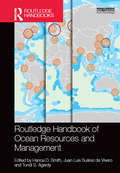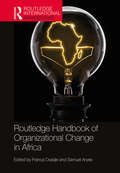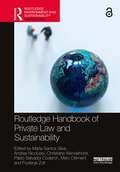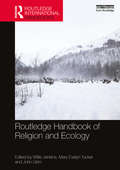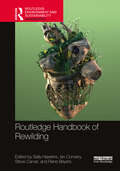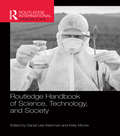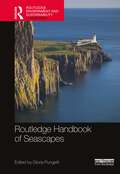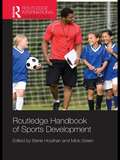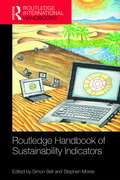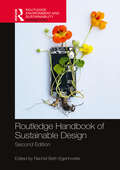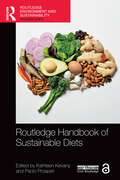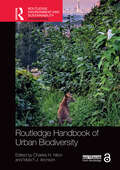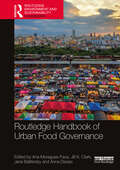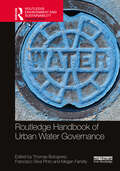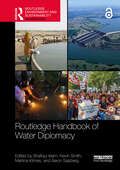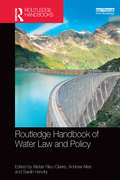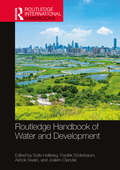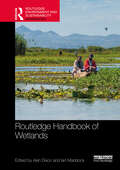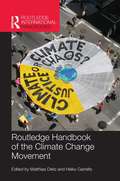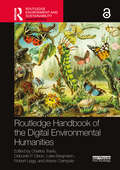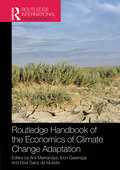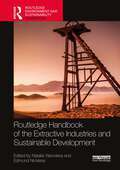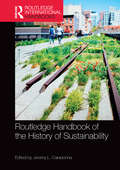- Table View
- List View
Routledge Handbook of Ocean Resources and Management (Routledge Environment and Sustainability Handbooks)
by Hance D. Smith Tundi S. Agardy Juan Luis Suárez de ViveroThis comprehensive handbook provides a global overview of ocean resources and management by focusing on critical issues relating to human development and the marine environment, their interrelationships as expressed through the uses of the sea as a resource, and the regional expression of these themes. The underlying approach is geographical, with prominence given to the biosphere, political arrangements and regional patterns – all considered to be especially crucial to the human understanding required for the use and management of the world's oceans. Part one addresses key themes in our knowledge of relationships between people and the sea on a global scale, including economic and political issues, and understanding and managing marine environments. Part two provides a systematic review of the uses of the sea, grouped into food, ocean space, materials and energy, and the sea as an environmental resource. Part three on the geography of the sea considers management strategies especially related to the state system, and regional management developments in both core economic regions and the developing periphery. The primary themes within each chapter are governance (including institutional and legal bases); policy – sets of ideas governing management; and management, both technical and general.
Routledge Handbook of Organizational Change in Africa (Routledge International Handbooks)
by Franca Ovadje Samuel AryeeAlthough change management and therefore effective adaptation to environmental complexity is considered a uniquely human cultural activity, the extensive change management literature is largely based on the experiences of organizations in the advanced economies of the West. As the economies of African countries become increasingly open, African organizations will need to be agile in order to adapt and grow in a dynamic, global environment. Currently, there is a dearth of contextualized knowledge on change management within Africa, but this handbook aims to address this by bringing together a wide range of experts to explore organizational change and change management from an African context. The handbook adopts a multidisciplinary (historical, philosophical, processual, and strategic) perspective as well as empirical accounts of change management. It addresses such issues as: What are the external and internal pressures for change? What is the content and process of change management? What are the essentials of effective change management? How can change management be theorized from an African perspective? What sort of leadership can best align with change management demands in an African context? How do organizations build internal change management capability? It is hoped that answers to these questions contained in the handbook will provide a contextualized understanding of change management which African organizations and scholars can leverage to respond to the threats and opportunities inherent in their increasingly dynamic environment. The handbook should constitute an essential reference for academics, researchers, and advanced students of change management, development studies, and African studies, as well as practitioners.
Routledge Handbook of Private Law and Sustainability (Routledge Environment and Sustainability Handbooks)
by Marta Santos Silva Andrea Nicolussi Christiane Wendehorst Pablo Salvador Coderch Marc Clément Fryderyk ZollThe Routledge Handbook of Private Law and Sustainability reflects on how the law can help tackle the current environmental challenges and make our societies more resilient to future crises.Sustainability has been high on the political agenda since the approval of the Sustainable Development Goals in 2015 and the EU Green Deal in 2019. The Green Agenda aims at making Europe the first climate‑neutral continent by 2050, but humanity persists in an ecological overshoot that puts at risk the survival of species, including that of our own. Drawing together a selection of leading thinkers in the field, this Handbook provides a curated overview of the most recent and relevant discussions for private lawyers related to environmental and sustainability concerns. The authors delve into case study examples from 20 countries in Europe and beyond and discuss a wide range of issues, including new property law and consumer law paradigms, the use of legal tech for promoting sustainable property management, strategies for fighting planned obsolescence, eco‑design, the servitisation economy, advances on corporate climate litigation and mandated green private sludges. Overall, the volume is designed to empower new generations of legal scholars to take an active role in the transition to a more sustainable future. It will also assist policymakers in producing better policy, through pinpointing the main legal issues that need to be addressed and offering a comparative overview of legal solutions and best practices.Divided into six key parts and overseen by a team of internationally recognised expert editors, this Handbook will be an essential resource for students, scholars, private lawyers and policymakers who wish to have a comprehensive, fundamental overview of how environmental sustainability concerns reflect on private law.
Routledge Handbook of Religion and Ecology (Routledge Environment and Sustainability Handbooks)
by Willis Jenkins, Mary Evelyn Tucker and John GrimThe moral values and interpretive systems of religions are crucially involved in how people imagine the challenges of sustainability and how societies mobilize to enhance ecosystem resilience and human well-being. The Routledge Handbook of Religion and Ecology provides the most comprehensive and authoritative overview of the field. It encourages both appreciative and critical angles regarding religious traditions, communities, attitude, and practices. It presents contrasting ways of thinking about "religion" and about "ecology" and about ways of connecting the two terms. Written by a team of leading international experts, the Handbook discusses dynamics of change within religious traditions as well as their roles in responding to global challenges such as climate change, water, conservation, food and population. It explores the interpretations of indigenous traditions regarding modern environmental problems drawing on such concepts as lifeway and indigenous knowledge. This volume uniquely intersects the field of religion and ecology with new directions within the humanities and the sciences. This interdisciplinary volume is an essential reference for scholars and students across the social sciences and humanities and for all those looking to understand the significance of religion in environmental studies and policy.
Routledge Handbook of Rewilding (Routledge Environment and Sustainability Handbooks)
by Sally Hawkins Ian Convery Steve Carver Rene BeyersThis handbook provides a comprehensive overview of the history, theory, and current practices of rewilding. Rewilding offers a transformational paradigm shift in conservation thinking, and as such is increasingly of interest to academics, policymakers, and practitioners. However, as a rapidly emerging area of conservation, the term has often been defined and used in a variety of different ways (both temporally and spatially). There is, therefore, the need for a comprehensive assessment of this field, and the Routledge Handbook of Rewilding fills this lacuna. The handbook is organised into four sections to reflect key areas of rewilding theory, practice, and debate: the evolution of rewilding, theoretical and practical underpinnings, applications and impacts, and the ethics and philosophy of rewilding. Drawing on a range of international case studies the handbook addresses many of the key issues, including land acquisition and longer-term planning, transitioning from restoration (human-led, nature enabled) to rewilding (nature-led, human enabled), and the role of political and social transformational change. Led by an editorial team who have extensive experience researching and practising rewilding, this handbook is essential reading for students, academics and practitioners interested in rewilding, ecological restoration, natural resource management and conservation.
Routledge Handbook of Science, Technology, and Society (Routledge International Handbooks)
by Kelly Moore Daniel Lee KleinmanOver the last decade or so, the field of science and technology studies (STS) has become an intellectually dynamic interdisciplinary arena. Concepts, methods, and theoretical perspectives are being drawn both from long-established and relatively young disciplines. From its origins in philosophical and political debates about the creation and use of scientific knowledge, STS has become a wide and deep space for the consideration of the place of science and technology in the world, past and present. The Routledge Handbook of Science, Technology and Society seeks to capture the dynamism and breadth of the field by presenting work that pushes the reader to think about science and technology and their intersections with social life in new ways. The interdisciplinary contributions by international experts in this handbook are organized around six topic areas: embodiment consuming technoscience digitization environments science as work rules and standards This volume highlights a range of theoretical and empirical approaches to some of the persistent – and new – questions in the field. It will be useful for students and scholars throughout the social sciences and humanities, including in science and technology studies, history, geography, critical race studies, sociology, communications, women’s and gender studies, anthropology, and political science.
Routledge Handbook of Seascapes (Routledge Environment and Sustainability Handbooks)
by Gloria PungettiSeascape studies have developed in response to questions arising from composite correlations such as coastal, island and marine research, social requirements, landscape design and planning, marine ecology, and environment and resource management. This global volume is the first comprehensive overview to provide a solid foundation on the concept of seascape, with the latest research findings from leading experts across a variety of fields, offering a holistic approach to seascape linking nature with culture, and theory with practice. Divided into six parts, it includes over 30 chapters from contributors around the world. Pioneering methods with illustrated case studies from the Mediterranean, Scandinavia, North Sea, North America and Asia serve as examples for future seascape development, conservation and governance. An important and extremely timely resource, the Routledge Handbook of Seascapes provides academics, practitioners, NGOs, consultants and government officials with a broad overview of current research and practice for future application and advance worldwide.
Routledge Handbook of Sports Development (Routledge International Handbooks)
by Barrie Houlihan Mick GreenSports development has become a prominent concern within both the academic study of sport and within the organisation and administration of sport. Now available in paperback, the Routledge Handbook of Sports Development is the first book to comprehensively map the wide-ranging territory of sports development as an activity and as a policy field, and to offer a definitive survey of current academic knowledge and professional practice. Spanning the whole spectrum of activity in sports development, from youth sport and mass participation to the development of elite athletes, the book identifies and defines the core functions of sports development, exploring the interface between sports development and cognate fields such as education, coaching, community welfare and policy. The book presents important new studies of sports development around the world, illustrating the breadth of practice within and between countries, and examines the most important issues facing practitioners within sports development today, from child protection to partnership working. With unparalleled depth and breadth of coverage, the Routledge Handbook of Sports Development is the definitive guide to policy, practice and research in sports development. It is essential reading for all students, researchers and professionals with an interest in this important and rapidly evolving discipline.
Routledge Handbook of Sustainability Indicators (Routledge International Handbooks)
by Stephen Morse Simon BellThis handbook provides researchers and students with an overview of the field of sustainability indicators (SIs) as applied in the interdisciplinary field of sustainable development. The editors have sought to include views from the center ground of SI development but also divergent ideas which represent some of the diverse, challenging and even edgy observations which are prominent in the wider field of SI thinking. The contributions in this handbook: • clearly set out the theoretical background and history of SIs, their origins, roots and initial goals • expand on the disciplines and modalities employed to develop SIs of various kinds • assess the various ways in which SI data are gathered and the availability (over space and time) and quality issues that surround them • explore the multiplex world of SIs as expressed in agencies around the world, via examples of SI practice and the lessons that have emerged from them • critically review the progress that SIs have made over the last 30 years • express the divergence of views which are held about the value of SIs, including differing theories on their efficacy, efficiency and ethics • explore the frontier of contemporary SI thinking, reviewing ante/post and systemic alternatives This multidisciplinary and international handbook will be of great interest to researchers, students and practitioners working in sustainability research and practice.
Routledge Handbook of Sustainable Design (Routledge Environment and Sustainability Handbooks)
by Rachel Beth EgenhoeferThe Routledge Handbook of Sustainable Design considers the design, not only of artifacts, but of structures, systems, and interactions in the context of sustaining our shared planet. This revised edition introduces new and updated chapters, as well as a new section on pedagogy for sustainable design. With authors from around the world, design is positioned in context with recent crises such as global pandemics, racial reckoning, political unrest, and natural disasters. Just as design is an interdisciplinary field, the climate crisis is deeply tangled in racial justice, gender justice, global health, economics, trade, and more. Divided into six sections, it presents a holistic approach to understanding the many facets of sustainable design: Part 1: Systems and Design Part 2: Complexities of Sustainable Design Part 3: Community Engaged Design for Local and Global Diversity Part 4: Design for Sustainable Behaviors Part 5: Design Futures Part 6: Pedagogy in Design for Sustainability Arguing that design needs to restore, regenerate, and rejuvenate our planet and people, this handbook will be invaluable to researchers, students, and practitioners across all subdisciplines of design, architecture, business, energy management, visual arts, and environmental studies, among others.
Routledge Handbook of Sustainable Diets (Routledge Environment and Sustainability Handbooks)
by Kathleen Kevany and Paolo ProsperiThis handbook presents a must-read, comprehensive and state of the art overview of sustainable diets, an issue critical to the environment and the health and well-being of society. Sustainable diets seek to minimise and mitigate the significant negative impact food production has on the environment. Simultaneously they aim to address worrying health trends in food consumption through the promotion of healthy diets that reduce premature disability, disease and death. Within the Routledge Handbook of Sustainable Diets, creative, compassionate, critical, and collaborative solutions are called for across nations, across disciplines and sectors. In order to address these wide-ranging issues the volume is split into sections dealing with environmental strategies, health and well-being, education and public engagement, social policies and food environments, transformations and food movements, economics and trade, design and measurement mechanisms and food sovereignty. Comprising of contributions from up and coming and established academics, the handbook provides a global, multi-disciplinary assessment of sustainable diets, drawing on case studies from regions across the world. The handbook concludes with a call to action, which provides readers with a comprehensive map of strategies that could dramatically increase sustainability and help to reverse global warming, diet related non-communicable diseases, and oppression and racism. This decisive collection is essential reading for students, researchers, practitioners, and policymakers concerned with promoting sustainable diets and thus establishing a sustainable food system to ensure access to healthy and nutritious food for all.
Routledge Handbook of Sustainable Diets (Routledge Environment and Sustainability Handbooks)
by Kathleen Kevany and Paolo ProsperiThis handbook presents a must-read, comprehensive and state of the art overview of sustainable diets, an issue critical to the environment and the health and well-being of society. Sustainable diets seek to minimise and mitigate the significant negative impact food production has on the environment. Simultaneously they aim to address worrying health trends in food consumption through the promotion of healthy diets that reduce premature disability, disease and death. Within the Routledge Handbook of Sustainable Diets, creative, compassionate, critical, and collaborative solutions are called for across nations, across disciplines and sectors. In order to address these wide-ranging issues the volume is split into sections dealing with environmental strategies, health and well-being, education and public engagement, social policies and food environments, transformations and food movements, economics and trade, design and measurement mechanisms and food sovereignty. Comprising of contributions from up and coming and established academics, the handbook provides a global, multi-disciplinary assessment of sustainable diets, drawing on case studies from regions across the world. The handbook concludes with a call to action, which provides readers with a comprehensive map of strategies that could dramatically increase sustainability and help to reverse global warming, diet related non-communicable diseases, and oppression and racism.This decisive collection is essential reading for students, researchers, practitioners, and policymakers concerned with promoting sustainable diets and thus establishing a sustainable food system to ensure access to healthy and nutritious food for all.
Routledge Handbook of Urban Biodiversity (Routledge Environment and Sustainability Handbooks)
by Charles H. Nilon Myla F.J. AronsonThis handbook provides a state-of-the-art, comprehensive overview of the expanding field of urban biodiversity. The field of urban biodiversity has emerged from within the broad discipline of urban ecology in the past two decades and is now a significant field in its own right. In view of this, the Routledge Handbook of Urban Biodiversity presents a thorough treatment of this field detailing the history of urban biodiversity, theoretical foundations, current state of knowledge, and application of that knowledge. The handbook is split into four parts: Part I: Setting the Stage for Urban Biodiversity Research and Practice Part II: Foundational Concepts and Theory in Urban Biodiversity Research Part III: Population and Community Ecology of Key Urban Taxa Part IV: Urban Biodiversity Practice: Management, Planning, and Design for Healthy Communities This volume contains interdisciplinary and global contributions from established and early career academics as well as professionals and practitioners, addressing two key fields in urban biodiversity: fundamental research focused on answering questions about the mechanisms explaining the distribution of species among and within cities; and applied research and work by practitioners to address concerns about urban biodiversity conservation, restoration, planning, design, and public involvement. This handbook is essential reading for students, academics, and professionals interested and working in the fields of urban biodiversity, ecology, nature conservation, urban planning, and landscape architecture.
Routledge Handbook of Urban Biodiversity (Routledge Environment and Sustainability Handbooks)
by Charles H. Nilon Myla F.J. AronsonThis handbook provides a state-of-the-art, comprehensive overview of the expanding field of urban biodiversity.The field of urban biodiversity has emerged from within the broad discipline of urban ecology in the past two decades and is now a significant field in its own right. In view of this, the Routledge Handbook of Urban Biodiversity presents a thorough treatment of this field detailing the history of urban biodiversity, theoretical foundations, current state of knowledge, and application of that knowledge. The handbook is split into four parts: Part I: Setting the Stage for Urban Biodiversity Research and Practice Part II: Foundational Concepts and Theory in Urban Biodiversity Research Part III: Population and Community Ecology of Key Urban Taxa Part IV: Urban Biodiversity Practice: Management, Planning, and Design for Healthy Communities This volume contains interdisciplinary and global contributions from established and early career academics as well as professionals and practitioners, addressing two key fields in urban biodiversity: fundamental research focused on answering questions about the mechanisms explaining the distribution of species among and within cities; and applied research and work by practitioners to address concerns about urban biodiversity conservation, restoration, planning, design, and public involvement. This handbook is essential reading for students, academics, and professionals interested and working in the fields of urban biodiversity, ecology, nature conservation, urban planning, and landscape architecture.
Routledge Handbook of Urban Food Governance (Routledge Environment and Sustainability Handbooks)
by Anna Davies Jane Battersby Jill K. Clark Ana Moragues-FausThe Routledge Handbook of Urban Food Governance is the first collection to reflect on and compile the currently dispersed histories, concepts and practices involved in the increasingly popular field of urban food governance. Unpacking the power of urban food governance and its capacity to affect lives through the transformation of cities and the global food system, the Handbook is structured into five parts. The first part focuses on histories of urban food governance to trace the historical roots of current dynamics and provide an impetus for the critical lens on urban food governance threaded through the Handbook. The second part presents a broad overview of the different frames, theories and concepts that have informed urban food governance scholarship. Drawing on the previous parts, part three engages with the practice of urban food governance by analysing plans, policies and programmes implemented in different contexts. Part four presents current knowledge on how urban food governance involves different agencies that operate across scales and sectors. The final part asks key figures in this field what the future holds for urban food governance in the midst of pressing societal and environmental challenges. Containing chapters written by emerging and established scholars, as well as practitioners, the Handbook provides a state of the art, global and diverse examination of the role of cities in delivering sustainable and secure food outcomes, as well as providing refreshed theoretical and practical tools to understand and transform urban food governance to enact more sustainable and just futures. The Routledge Handbook of Urban Food Governance will be essential reading for students, scholars, practitioners and policymakers interested in food governance, urban studies, sustainable food and agriculture, and sustainable living more broadly.
Routledge Handbook of Urban Water Governance (Routledge Environment and Sustainability Handbooks)
by Thomas Bolognesi, Francisco Silva Pinto and Megan FarrellyThis handbook provides a comprehensive, state-of-the-art overview of urban water governance. Of the many growing challenges presented by rapid urbanization, water governance is a critical one and while urban water governance is now regarded as a critical field of research, the literature is fragmented. For the first time, this handbook brings together urban water governance research, containing interdisciplinary contributions from established and emerging scholars, practitioners, and policymakers. It addresses the key questions of how urban water governance works, how is it shaped, and what the impacts are. The handbook's structure offers a progressive entry into the complexity of urban water governance. Starting with technical dimensions, the handbook addresses supply and demand, wastewater, and sanitation. It then considers regulation and economic factors, examining water utilities and services. Political processes, and the actors involved, are addressed and the handbook finishes with a part focusing on governance and sustainability, where chapters address critically important topics such as access to water, water safety, and water security. This handbook is essential reading for students, scholars, and professionals interested in urban water governance, urban studies, and water resource management and sustainability more broadly.
Routledge Handbook of Water Diplomacy (Routledge Environment and Sustainability Handbooks)
by Kevin Smith Shafiqul Islam Martina Klimes Aaron SalzbergThe Routledge Handbook of Water Diplomacy is a comprehensive guide to understanding and practicing water diplomacy – a framework for building relationships, negotiating shared interests, and managing complex water challenges across physical, political, and societal boundaries.In an era marked by rising scarcity, deepening uncertainty, and growing geopolitical tension, this timely volume offers actionable insights for negotiated problem-solving grounded in both scientific understanding and diplomatic skill. Moving beyond abstract theory and technical fixes, the Handbook introduces a dual-pathway structure designed to meet the diverse needs of its users. The “Working Together” pathway invites readers to engage with water diplomacy through the lens of their roles, whether as professionals, decision-makers, funders, researchers, or affected communities. The “What Matters and Why” pathway highlights key thematic dimensions, including process design, adaptive learning, trust-building, divergent worldviews, and the management of uncertainty. Together, these pathways guide readers through a wide range of case studies, from transboundary river basins to subnational disputes and community-scale water systems, demonstrating how water diplomacy can resolve conflict, enable cooperation, and support adaptive, context-sensitive 'learning by doing' under conditions of complexity and change. Whether addressing a transboundary dispute or a local allocation challenge, this book provides guiding principles, practical tools, and real-world cases to support water solutions that are scientifically credible, socially inclusive, and politically feasible.The Routledge Handbook of Water Diplomacy serves as an essential reference volume for students and scholars of water diplomacy, water governance and water resource management, as well as for policymakers and water professionals who are seeking actionable insights into the nuanced challenges they encounter as they work to promote a more sustainable and equitable water future.The Open Access version of this book, available at http://www.taylorfrancis.com, has been made available under a Creative Commons Attribution- NonCommercial- ShareAlike 4.0 International (CC BY- NC- SA) license.
Routledge Handbook of Water Law and Policy (Routledge Environment and Sustainability Handbooks)
by Alistair Rieu-Clarke, Andrew Allan and Sarah HendryWater plays a key role in addressing the most pressing global challenges of our time, including climate change adaptation, food and energy security, environmental sustainability and the promotion of peace and stability. This comprehensive handbook explores the pivotal place of law and policy in efforts to ensure that water enables positive responses to these challenges and provides a basis for sound governance. The book reveals that significant progress has been made in recent decades to strengthen the governance of water resource management at different scales, including helping to address international and sub-national conflicts over transboundary water resources. It demonstrates that ‘effective’ laws and policies are fundamental drivers for the safe, equitable and sustainable utilization of water. However, it is also shown that what might constitute an effective law or policy related to water resources management is still hotly debated. As such, the handbook provides an important and definitive reference text for all studying water governance and management.
Routledge Handbook of Water and Development (Routledge International Handbooks)
by Fredrik Söderbaum Joakim Öjendal Sofie Hellberg Ashok SwainWater is essential for human life and at the centre of political, economic, and socio-cultural development. This Routledge Handbook of Water and Development offers a systematic, wide-ranging, and state-of-the-art guide to the diverse links between water and development across the globe. It is organized into four parts: Part I explores the most significant theories and approaches to the relationship between water and development. Part II consists of carefully selected in-depth case studies, revealing how water utilization and management are deeply intertwined with historical development paths and economic and socio-cultural structures. Part III analyses the role of governance in the management of water and development. Part IV covers the most urgent themes and issues pertaining to water and development in the contemporary world, ranging from climate change and water stress to agriculture and migration. The 32 chapters by leading experts are meant to stimulate researchers and students in a wide range of disciplines in the social and natural sciences, including Geography, Environmental Studies, Development Studies, and Political Science. The Handbook will also be of great value to policymakers and practitioners.
Routledge Handbook of Wetlands (Routledge Environment and Sustainability Handbooks)
by Ian Maddock Alan DixonThis handbook provides a comprehensive and interdisciplinary overview of the place, value and significance of wetlands, presenting perspectives from across the environmental and social sciences.Recent decades have witnessed unprecedented global interest in wetlands and the critical role they play in supporting biodiversity and ecosystem services such as carbon storage, flood mitigation, as well as their direct benefits for people and society that include the provision of food, clean water and a range of cultural services. This Routledge Handbook of Wetlands brings together a wide range of perspectives from social and environmental disciplines, and voices from different wetland stakeholders from the global north and south, to present an assessment of our current understanding of wetlands, their environmental significance, and their place in society and policy. A recurring theme of the book is an exploration of how our current knowledge of wetlands, that is often fragmented along traditional disciplinary lines, can be brought together to enable a more integrated, interdisciplinary and social-ecological conceptualisation that aligns more closely with real-world complex challenges, and which offers new directions in wetland management for sustainable development.This handbook will be essential reading for students and scholars of wetland management, environmental science, water resource management, conservation ecology, environmental humanities and sustainable development.
Routledge Handbook of the Climate Change Movement (Routledge Environment and Sustainability Handbooks)
by Matthias Dietz Heiko GarreltsThis handbook provides a comprehensive overview of the growing transnational climate movement. A dual focus on climate politics and civil society provides a hitherto unavailable broad and systematic analysis of the current global movement, highlighting how its dynamic and diverse character can play an important role in environmental politics and climate protection. The range of contributors, from well-known academics to activist-scholars, look at climate movements in the developed and developing world, north and south, small and large, central and marginal. The movement is examined as a whole and as single actors, thereby capturing its scope, structure, development, activities and influence. The book thoroughly addresses theoretical approaches, from classic social movement theory to the influence of environmental justice frames, and follows this with a systematic focus on regions, specific NGOs and activists, cases and strategies, as well as relations with peripheral groups. In its breadth, balance and depth, this accessible volume offers a fresh and important take on the question of social mobilization around climate change, making it an essential text for advanced undergraduates, postgraduate students and researchers in the social sciences.
Routledge Handbook of the Digital Environmental Humanities (Routledge Environment and Sustainability Handbooks)
by Luke Bergmann Charles Travis Deborah P. Dixon Robert Legg Arlene CrampsieThe Routledge Handbook of the Digital Environmental Humanities explores the digital methods and tools scholars use to observe, interpret, and manage nature in several different academic fields. Employing historical, philosophical, linguistic, literary, and cultural lenses, this handbook explores how the digital environmental humanities (DEH), as an emerging field, recognises its convergence with the environmental humanities. As such, it is empirically, critically, and ethically engaged in exploring digitally mediated, visualised, and parsed framings of past, present, and future environments, landscapes, and cultures. Currently, humanities, geographical, cartographical, informatic, and computing disciplines are finding a common space in the DEH and are bringing the use of digital applications, coding, and software into league with literary and cultural studies and the visual, film, and performing arts. In doing so, the DEH facilitates transdisciplinary encounters between fields as diverse as human cognition, gaming, bioinformatics and linguistics, social media, literature and history, music, painting, philology, philosophy, and the earth and environmental sciences. This handbook will be essential reading for those interested in the use of digital tools in the study of the environment from a wide range of disciplines and for those working in the environmental humanities more generally.
Routledge Handbook of the Economics of Climate Change Adaptation: Routledge Handbook Of The Economics Of Climate Change Adaptation (Routledge International Handbooks)
by Ibon Galarraga Anil Markandya Elisa Sainz de MurietaClimate change is one of the greatest challenges facing human kind owing to the great uncertainty regarding future impacts, which affect all regions and many ecosystems. Many publications deal with economic issues relating to mitigation policies, but the economics of adaptation to climate change has received comparatively little attention. However, this area is is critical and a central pillar of any adaptation strategy or plan and is the economic dimension, which therefore merits the increase in attention it is receiving. This book deals with the difficulties that face the economics of adaptation. Critical issues include: uncertainty; baselines; reversibility, flexibility and adaptive management; distributional impacts; discount rates and time horizons; mixing monetary and non-monetary evaluations and limits to the use of cost-benefit analysis; economy-wide impacts and cross-sectoral linkages. All of these are addressed in the book from the perspective of economics of adaptation. Other dimensions of adaptation are also included, such as the role of low- and middle-income countries, technology and the impacts of extreme events. This timely book will prove essential reading for international researchers and policy makers in the fields of natural resources, environmental economics and climate change.
Routledge Handbook of the Extractive Industries and Sustainable Development (Routledge Environment and Sustainability Handbooks)
by Natalia YakovlevaThe Routledge Handbook of the Extractive Industries and Sustainable Development provides a cutting-edge, comprehensive overview of current trends, challenges and opportunities for metal and mineral production and use, in the context of climate change and the United Nations Sustainable Development Agenda 2030. Minerals and metals are used throughout the world in manufacturing, construction, infrastructure, production of electronics and consumer goods. Alongside this widespread use, extraction and processing of mineral resources take place in almost every nation at varying scales, both in developing countries and major developed nations. The chapters in this interdisciplinary handbook examine the international governance mechanisms regulating social, environmental and economic implications of mineral resource extraction and use. The original contributions, from a range of scholars, examine the relevance of the mining industry to the United Nations Sustainable Development Goals (SDGs), reviewing important themes such as local communities Indigenous peoples, gender equality and fair trade, showing how mining can influence global sustainable development. The chapters are organised into three sections: Global Trends in Mineral Resources Consumption and Production; Technology, Minerals and Sustainable Development; and Management of Social, Environmental and Economic Issues in the Mining Industry. This handbook will serve as an important resource for students and researchers of geology, geography, earth science, environmental studies, engineering, international development, sustainable development and business management, among others. It will also be of interest to professionals in governmental, international and non-governmental organisations that are working on issues of resource governance, environmental protection and social justice.
Routledge Handbook of the History of Sustainability (Routledge Environment and Sustainability Handbooks)
by Jeremy L. CaradonnaThe Routledge Handbook of the History of Sustainability is a far-reaching survey of the deep and contemporary history of sustainability. This innovative resource will help to define the history of sustainability as an identifiable field. It provides a unique resource for advanced undergraduates, graduate students, and scholars, and delivers essential context for understanding the current state and future path of the sustainability movement. The history of sustainability is an increasingly important domain within the discipline of history, which draws on an interdisciplinary set of fields, ranging from energy studies, transportation, and urbanism to environmental history, economics, and philosophy. Key sections in this handbook cover the historiography of sustainability, resilience and collapse in historical societies, the deep roots of sustainability (seventeenth century to nineteenth century), the recent history of sustainability (twentieth century to present), and core issues and key debates in sustainability. This handbook is an invaluable research and teaching tool for those interested in the history and development of sustainability and an essential resource for the many sustainability studies programs that now exist in the world's universities.
